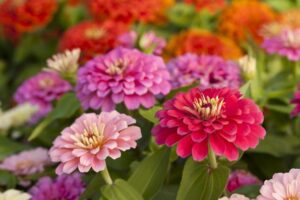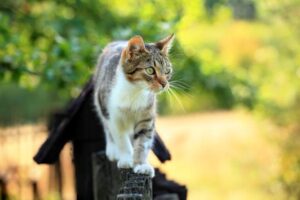
When taking the decision to get a pet, we naturally pet-proof our homes, taking care to set rules to keep them safe. But once outside, how many of us are familiar with some of the more common hazards that can pose danger for our new family members? Creating pet-friendly spaces in and around the home is achievable with a little guidance, time and a handful of simple measures.
As we approach the warmer months of summer, we look at some of the hazards we can find in our own gardens and how to avoid them.
Garden chemicals
Containing a very harmful metaldehyde-based ingredient, slug pellets can be one of the most dangerous substances our cats and dogs can ingest, causing significant poisoning. Common signs that your pet has eaten slug pellets include muscle spasm and inability to co-ordinate, tremors and even seizures. It is essential to get emergency veterinary attention as quickly as possible if you suspect your pet has eaten this poison.
Equally as toxic are common garden fertilisers and chemicals, ant powders and other gels and baits. Be aware that these substances can harm pets, so need to be kept out of reach and risk of ingestion. Know how and where to use and how to protect that area from any animal. Know how to store them safely, away from their inquisitive noses and paws!

Flower and plant toxins
In addition to our man-made contributions to garden hazards, throughout the year, there are many natural toxins in and around outdoor spaces that can prove equally as harmful to pets. Summer flowers and plants that we need to be mindful of include some of our common garden favourites: geranium, lily, chrysanthemum, hydrangea, foxglove and English ivy. The list is more extensive and alters seasonally, which you can find at www.petpoisonhelpline.com. Be aware of what grows in your garden and ensure protection for your furry companions. Should you notice your pet excessively drooling, vomiting with tremors, seek help. Toxins from plants can lead to seizures and ultimately prove fatal if left.
Summer heat
As we would with the human members of our family, providing areas of shade for your cats and dogs throughout sunny days is essential. The heat from the sun can quickly tire and dehydrate your pet and even cause skin damage. Create a safe, shady place for them to retire to. Take care when using hosepipes, too! Whilst it may seem appealing to cool off your four-legged friend after a warm walk, be mindful that the first flow of water from a hosepipe that has been sat in the sun can reach temperatures of 120 degrees C. Equally, we need to ensure water is not too cold either, and that the pressure is appropriate to use on a dog. With these checks in place, your dog can enjoy safe fun and cool down at the same time.
Secure fencing
Finally, securing a dedicated space for our pets not only ensures their safety, but will keep your neighbours happy too! We all know that our pet cats will hop over walls and fences, roam and hunt, an accepted part of cat life. However, with dogs, we need to take much more care and precautions to prevent them straying away from the garden into danger. With thoughtful planning and planting, you can create a dog-friendly garden, free from toxins and hazards. Secure fencing, raised beds, shaded areas and space to play. Keep your pets happy, healthy and safe this summer.
For more information or if you have any concerns about your pet and outdoor hazards, please contact your local surgery, we’d be happy to help.

